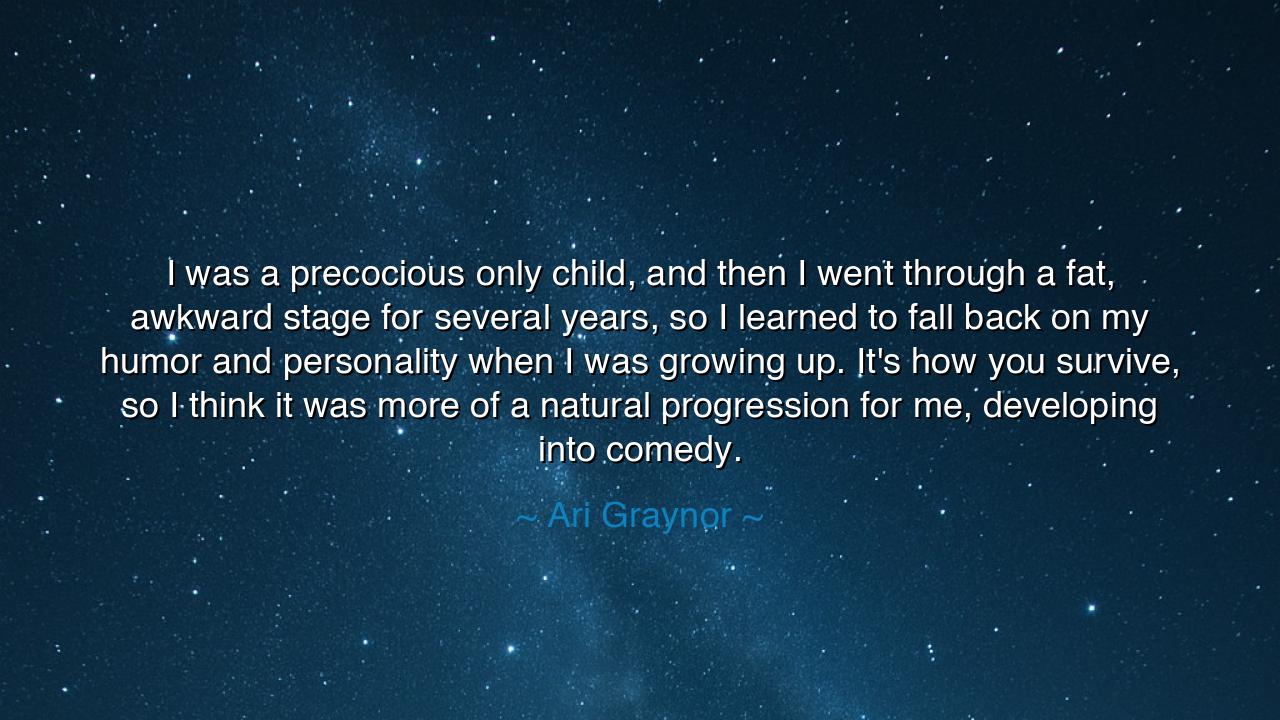
I was a precocious only child, and then I went through a fat
I was a precocious only child, and then I went through a fat, awkward stage for several years, so I learned to fall back on my humor and personality when I was growing up. It's how you survive, so I think it was more of a natural progression for me, developing into comedy.






In the words of Ari Graynor, “I was a precocious only child, and then I went through a fat, awkward stage for several years, so I learned to fall back on my humor and personality when I was growing up. It's how you survive, so I think it was more of a natural progression for me, developing into comedy.”
These words, tender yet triumphant, reveal an eternal truth about the human spirit — that humor is not merely an art, but a shield, a way of surviving the long nights of self-doubt and loneliness. In this confession, Graynor speaks not only of her own childhood, but of the universal journey of the soul — the passage from vulnerability to resilience, from pain to laughter. She teaches us that the ability to find joy amid struggle is not a gift of fortune, but the alchemy of the heart, turning insecurity into light.
When she calls herself a “precocious only child,” we see the early spark of curiosity, the flame of individuality that burned within her even before the world could name it. The child who speaks too soon, feels too deeply, and stands too often alone learns early to look inward for companionship. But then comes the shadowed time — the awkward years, the stage where the world grows louder, and the self feels smaller. Many have known this passage — the time when appearance overshadows spirit, when the laughter of others cuts deeper than silence. Yet Graynor’s story turns toward the light, for instead of letting these wounds harden her, she chose humor as her ally. In making others laugh, she reclaimed her place among them. In laughter, she found not escape, but connection.
The origin of this wisdom lies deep in the story of humankind. From the ancient jesters of courts to the wandering storytellers of deserts, humor has always been the companion of hardship. It is said that Aristophanes, the comic playwright of Athens, mocked the powerful not because he was safe, but because he was brave — because laughter gave him the courage to speak truth where others trembled. Similarly, the peasants of medieval Europe told jokes of kings and priests not in rebellion alone, but in survival — for laughter was the only weapon of the powerless. So too did Graynor, in her youth, discover that humor is survival, the language of those who refuse to be broken by pain.
To “fall back on humor and personality,” as she says, is not weakness; it is strategy — the wisdom of the heart learning to protect itself. The child who laughs at her own missteps steals the power of mockery from others. The one who makes light of her flaws transforms shame into strength. The ancients knew this as a form of spiritual mastery. The Stoics taught that no one can wound the soul that chooses its own meaning; the same is true of the one who chooses to laugh. In the face of adversity, humor becomes a declaration: You cannot take my joy from me, for it is mine to create.
Consider the tale of Lucille Ball, who, like Graynor, was no stranger to struggle. Before she became one of the most beloved comedians in history, Ball endured rejection after rejection, mocked for her voice, her looks, and her boldness. Yet she transformed those very traits into her greatest strengths. Her humor came not from perfection, but from imperfection; not from ease, but from endurance. She turned her awkwardness into grace, her clumsiness into art. Through laughter, she rewrote her own story. So too does Graynor’s reflection remind us that comedy is not born from comfort, but from courage — the courage to stand before the world and say, I may stumble, but I will still smile.
There is also innocence in her words — the recognition that humor, when born from the heart, is not cynical, but kind. Her laughter is not mockery; it is communion. She laughs not to separate herself from others, but to draw them near. This is the essence of true comedy — not the laughter that wounds, but the laughter that heals; not the jest that divides, but the one that reminds us of our shared humanity. The ancients would have called this sacred laughter, for it reveals that even in imperfection, there is beauty, and in awkwardness, there is grace.
Thus, let this be the lesson passed down from Ari Graynor’s wisdom: embrace your flaws, for they are the soil from which your gifts will grow. When you are mocked, find your laughter; when you feel unseen, let your spirit shine brighter. Use your humor not to hide, but to connect; not to escape, but to endure. For laughter, when born of truth, is the purest act of resilience. It is the voice of the soul that refuses to be silenced.
And so, dear listener, remember her journey. When you find yourself in your own awkward stage — in body, in life, or in heart — do not despair. Fall back on your humor, on your personality, on your humanity. Let laughter be your survival and your offering. For the one who learns to laugh at themselves learns to live without fear. In that laughter lies not only joy, but victory — the quiet, heroic triumph of the spirit that knows how to turn its wounds into wisdom, and its pain into light.






AAdministratorAdministrator
Welcome, honored guests. Please leave a comment, we will respond soon